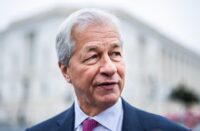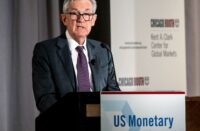In 2014, Cho Tak Wong, the head of automotive glass titan Fuyao Glass, purchased the vacant General Motors production facility in Moraine, Ohio. However, since Donald Trump’s first term, there has been a marked decrease in Chinese investments in the US, a trend that analysts predict will not change as Trump resumes his role in the White House.
Trump has indicated the possibility of additional tariffs on Chinese products following his inauguration on Monday, reflecting a gradually strengthening US stance towards Beijing. According to economist Rafiq Dossani from the US-based RAND corporation, Trump’s focus is not on encouraging Chinese corporations to invest in the US. Dossani suggests that there’s a clash in ideology, with the prevailing rhetoric aimed at excluding China from the US, save for their low-end products.
In recent weeks, UAE property powerhouse Damac has committed $20 billion for the construction of US data centers, while SoftBank CEO Masayoshi Son has pledged a $100 billion investment for AI development in the US over Trump’s four-year term.
However, the American Enterprise Institute data shows that Chinese investment deals in the US have drastically slowed down. A mere $860 million was invested in the US in the first half of 2024, down from $1.66 billion in 2023, and significantly lower than the $46.86 billion invested in 2017, the year Trump began his first term.
At their height, Chinese corporations made headline-grabbing acquisitions in the US, such as the purchase of New York’s Waldorf Astoria hotel. However, regulatory restrictions from both sides have significantly curtailed these investments.
Danielle Goh, senior research analyst at Rhodium Group, notes that Chinese investment in the US has dramatically decreased since Beijing tightened control over capital outflows in 2017, coupled with US regulatory policies aimed at excluding investments in specific sectors. Goh doesn’t foresee a recovery of Chinese investments in the US to the levels seen between 2016 and 2017 in the near future.
Instead, Chinese businesses have started to focus more on small joint ventures with US companies or greenfield investments, where businesses are built from the ground up. For instance, Chinese battery manufacturing company EVE Energy has partnered with US engine giant Cummins’ Accelera division, Daimler Truck and PACCAR, owning a 10% stake in their joint venture.
Trump has hinted at using tariffs to pressure Chinese investment in the US. He stated that he will bring auto jobs back to the country through the appropriate use of taxes, tariffs, and incentives and prevent the construction of massive auto manufacturing plants in other countries, including China.
However, even if Trump encourages or forces more Chinese investment through tariffs, large investments are long-term processes that won’t materialize overnight. Additionally, the unpredictability of Trump’s policies adds another level of complexity to the situation. As Derek Scissors, a senior fellow at the American Enterprise Institute, points out, Trump welcoming Chinese companies in 2025 does not guarantee a similar stance in 2029.




